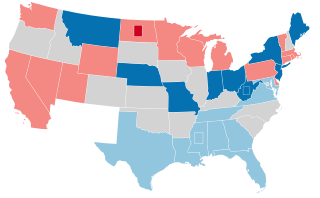
Albert J. Wilke was a member of the Michigan Senate.

Albert J. Wilke was a member of the Michigan Senate.
Wilke was born on December 31, 1895, in Port Washington, Wisconsin. [1] He died on July 29, 1977, in Iron Mountain, Michigan.
Wilke was a member of the Senate from 1949 to 1950. Previously, he was Register of Deeds of Dickinson County, Michigan, from 1935 to 1946 and a delegate to the 1944 Democratic National Convention that nominated Franklin D. Roosevelt for a historic fourth term as President of the United States. He was an unsuccessful candidate in the general election for the Michigan House of Representatives in 1954 and in the Democratic primary in 1958.

Milton Robert Carr, commonly known as Bob Carr, is an American lawyer, academic, and politician from the U.S. state of Michigan.

The 1910–11 United States Senate election, although the 17th Amendment was not passed until 1913, some states elected their senators directly before its passage. Oregon pioneered direct election and experimented with different measures over several years until it succeeded in 1907. Soon after, Nebraska followed suit and laid the foundation for other states to adopt measures reflecting the people's will. By 1912, as many as 29 states elected senators either as nominees of their party's primary or in conjunction with a general election.
Herbert Joseph McGlinchey was an American politician from Pennsylvania who served as a Democratic member of the U.S. House of Representatives for Pennsylvania's 6th congressional district from 1945 to 1947 and the Pennsylvania Senate for the 5th district from 1965 to 1972.

Elections for the Pennsylvania State Senate were held on November 7, 2000, with even-numbered districts being contested. State Senators are elected for four-year terms, with half of the Senate seats up for a vote every two years. The term of office for those elected in 2000 ran from January 3, 2001 until November 30, 2004. Necessary primary elections were held on April 27, 2004.
Albert V. "Bud" Belan was a Democratic member of the Pennsylvania State Senate.
Francis J. Lynch was an American politician from Pennsylvania who served as a Democratic member of the Pennsylvania State Senate for the 2nd district from 1973 to 1993.
James A. Romanelli is a former Democratic member of the Pennsylvania House of Representatives and the Pennsylvania State Senate.
The 1850–51 United States Senate elections were elections which had the Democratic Party lose seats, but retain a majority in the United States Senate.
The 1856–57 United States Senate elections were elections which had the young Republican Party assume its position as one of the United States's two main political parties. The Whigs and Free Soilers were gone by the time the next Congress began.
The 1874–75 United States Senate elections had the Democratic Party gain nine seats in the United States Senate from the Republican Party. Republicans remained in the majority, however.
The 1876–77 United States Senate elections had the Democratic Party gain five seats in the United States Senate, and coincided with Rutherford B. Hayes's narrow election as president. Republicans remained in the majority, however.

The 1900–01 United States Senate elections were elections in which both the Republicans and the Democrats gained two seats in the United States Senate at the expense of various third parties and vacancies, and which corresponded with President William McKinley's re-election as well as the 1900 House of Representatives elections.

The 1902–03 United States Senate elections were elections in which the Democratic Party gained four seats in the United States Senate, but the Republicans kept their strong majority.
The 1844–45 United States Senate elections were elections which, coinciding with James K. Polk's election, had the Democratic Party retake control of the United States Senate, gaining a net total of eleven seats from the Whigs.
The 1884–85 United States Senate elections were elections that coincided with the presidential election of 1884. Both Republicans and Democrats lost seats in the United States Senate due to the failure of three state legislatures to finish elections in time. Republicans, nevertheless, retained majority control and the Readjusters joined their caucus. By the beginning of the first session, in December 1885, Republicans had won all three vacant seats, increasing their majority.
The 1890–91 United States Senate elections were elections in which the Republican Party lost four seats in the United States Senate, though still retaining a slim majority. That majority was increased, however, upon the admission of two more states with Republican senators.
The 1866–67 United States Senate elections were elections that saw the Republican Party gain two seats in the United States Senate as several of the Southern States were readmitted during Reconstruction, enlarging their majority.
The 1860–61 United States Senate elections were elections corresponding with Abraham Lincoln's election to the presidency. The nascent Republican Party increased their Senate seats in the regular elections, and after southern Democrats withdrew to join the Confederacy, Republicans gained control of the United States Senate. To establish a quorum with fewer members, a lower total seat number was taken into account.

The 1794 United States Senate special election in Pennsylvania was held on March 31, 1794. James Ross was elected by the Pennsylvania General Assembly to the United States Senate.

Benjamin Champneys was an American lawyer, politician and judge, who served as a Democratic member of the Pennsylvania House of Representatives, the Pennsylvania Senate and as Pennsylvania State Attorney General.